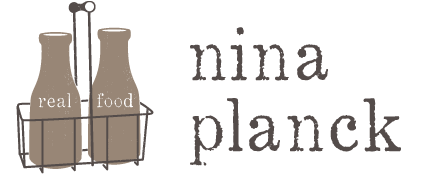The New York Times Style Magazine Book Review: “The New Puritans” by Holly Brubach
This article by by Holly Brubach was published in the New York Times Magazine on May 7, 2006.
We were already beating ourselves up about the damage we've done to our arteries. Now along comes "The Ethical Gourmet: How to Enjoy Great Food That Is Humanely Raised, Sustainable, Non-endangered, and That Replenishes the Earth" (Broadway Books), by Jay Weinstein, which would seem to offer all the fun of a guilt trip with a tour guide…
And "Real Food: What to Eat and Why" (Bloomsbury), by Nina Planck, poses a convincing alternative to the prevailing dietary guidelines, even those treated as gospel…
In the course of educating readers, the authors' personalities emerge… Of the group, it is Planck who is the most companionable. Her capacity for humor and self-deprecation makes for good company, and her intelligence and skepticism inspire confidence. To those who proscribe dairy products on the premise that milk was designed for newborn calves, not humans (a popular, if somewhat bizarre, argument), she retorts that a tomato was designed to make more tomato plants, not pasta sauce. Cataloging her own history, which spans a series of draconian regimens, including vegan, vegetarian, low fat, low saturated fat and low cholesterol, she labels one category "New Foods I Tried to Love" and lists "Various imitation foods made with soy and rice." Planck now eats and, even more outrageously, advocates grass-fed meat and whole dairy products…
Fat, cholesterol, carbs, red meat — none of these, Planck contends, is the problem. Instead, she lays the blame on chemicals and industrial food, including "new" fats, many of which are often hydrogenated. Industrial food, she says, is to blame for the steep rise in rates of disease, especially heart disease, diabetes and cancer. Planck arrives at this incendiary conclusion via Darwin and research into Stone Age eating habits, which flies in the face of widespread myths and confirms that, contrary to popular assumptions, humans used to be more carnivorous, not less. "I doubt that foods we've eaten for millions of years cause cancer," she writes…
The "Think globally, eat locally" message comes across loud and clear, and these books provide invaluable online resources for information and hard-to-find "real food." … Radical as Planck's ideas may be, the case she makes for them strikes me as eminently sensible…
